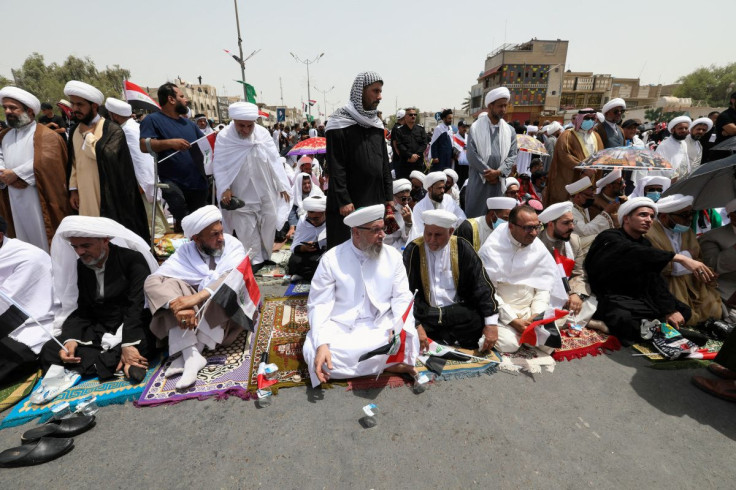Sectarian, Political Crisis Prevents Oil-Rich Iraq From Reaping Dividends

Oil-rich Iraq is currently facing a food crisis, an unemployment rate of 40 percent, water and power outages, and soil degradation, but this did not deter the venal political factions from cut-throat competition for power. Thus the mandatory two-thirds majority needed to elect the next president, who, in turn, will name the next prime minister and his cabinet, has become elusive.
According to the Ministry of Petroleum, Iraq reported oil exports worth $11.3 billion dollars, a figure not seen for decades, in June-end. State-owned oil companies sold a barrel of oil for $112 in June, while the figure was a whopping $140 in March.
Iraq has already emerged as the world's largest crude oil market. "Iraq has the capacity to increase its oil production by 200,000 barrels per day this year if asked to do so," said Hassan Mohammed, deputy director of the Basra Oil Company.
The skyrocketing global oil prices would have come to the aid of oil-rich Iraq to alleviate the acute social crisis in the country to a greater extent. But the Middle Eastern nation has been without a government for 294 days, so unable to set a budget for 2022. Currently, the nation has become a proxy battleground for regional and international political conflicts.
A new government, following the elections in October 2021, is difficult to come by as supporters of the nationalist Shiite cleric Muqtada Al-Sadr have stormed Baghdad's Green Zone, the heavily fortified area that houses the embassies, and have been occupying the federal parliament since July 30.
More than 125 people have been injured in the protests, which are spearheaded by Al-Sadr, sharpening divisions within Shiite parties, which represent the demographic majority and play a crucial role in the government formation under the sectarian quota system in the Constitution.
In last October's elections, Al-Sadr's Sairoon movement won a voter turnout of just 41 percent and won the most seats (73) in the 329-seat parliament, up from 54 in 2018, at the expense of the Coordination Framework, an Iran-allied Shiia party.
The victory for powerful al-Sadr jolted rival Shiia parties who, in turn, blocked his efforts to form a government.Al-Sadr and his Kurdish and Sunni allies are pitted against the Coordination Framework. When the Coordination Framework came up with its own candidate, Mohammed Shiya Al-Sudani, as prime minister, Al-Sadr simply opposed his candidacy, citing close ties with former regimes and alleging that al-Sudani would serve the interests of Iran.
In June, Al-Sadr forced his entire bloc to renounce their seats in parliament, setting the stage for an open street war and instability to force the dissolution of parliament and new elections.
Neither side, who have heavily-armed paramilitary wings, appears willing to budge. The Iran-Iraq internal Shiia rivalry is played out in the open, making cobbling together a government next to impossible.
Currently, Iraq earns record oil income because of high prices and the nation has not seen any major wars since the defeat of the Islamic State five years ago.
Al-Sadr, the former militia leader and a mercurial cleric, who led the Shiia resistance to the U.S. occupation, and his Shiia rivals have turned his face away from the immense suffering of Iraq and its people at the time of need and record oil prices.
Since early this year, the caretaker government of Prime Minister Mustafa Al-Kadhimi has been at the helm of the deeply divided nation which has some 1.2 million people as internally displaced and 250,000 refugees from war-torn Syria.
After all, the deadlock in the country is traced to the sectarian quota system or muhasasa like the Mediterranean nation of Lebanon, introduced by the U.S. after it occupied Iraq in 2003.
The ethnic-confessional division of institutional functions demands the head of state to be from Kurdish representatives, the speaker to be a Sunni and the prime minister a Shiia. Five seats are allotted to the minority Christians under the national electoral system.
Infighting among the Kurdish parties that run the semi-autonomous Kurdistan region in northern Iraq is not waning in the selection of a president who, once endorsed by parliament, names a prime minister.
The Patriotic Union of Kurdistan, which has held the presidency since 2003, wants this time. But, the Kurdistan Democratic Party (KDP), which won the largest number of Kurdish votes by far this time, is sticking to its own candidate for president.
The U.S., as part of its broader plan, is trying to prevent Iraq from coming into the sphere of influence of Iran and has made moves under caretaker prime minister Al-Kadhimi.
Turkey, a NATO member, is engaged in conflict in Northern Kurdistan and has military bases and outposts on Iraqi territory. Its military is fighting as part of Ankara's decades-long war with the separatist Kurdistan Workers' Party (PKK).
According to Iraq's foreign ministry, Iraq has recorded 22,700 violations of sovereignty by Turkey since 2018 and 296 complaints have been submitted to Ankara.
The government formation under the sectarian-based constitution appears to be no less contentious for the oil-rich country. With the polls, Iraq was hoping for the best but got the worst.
























